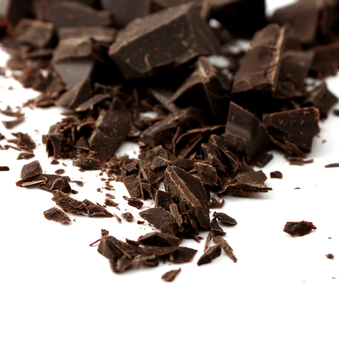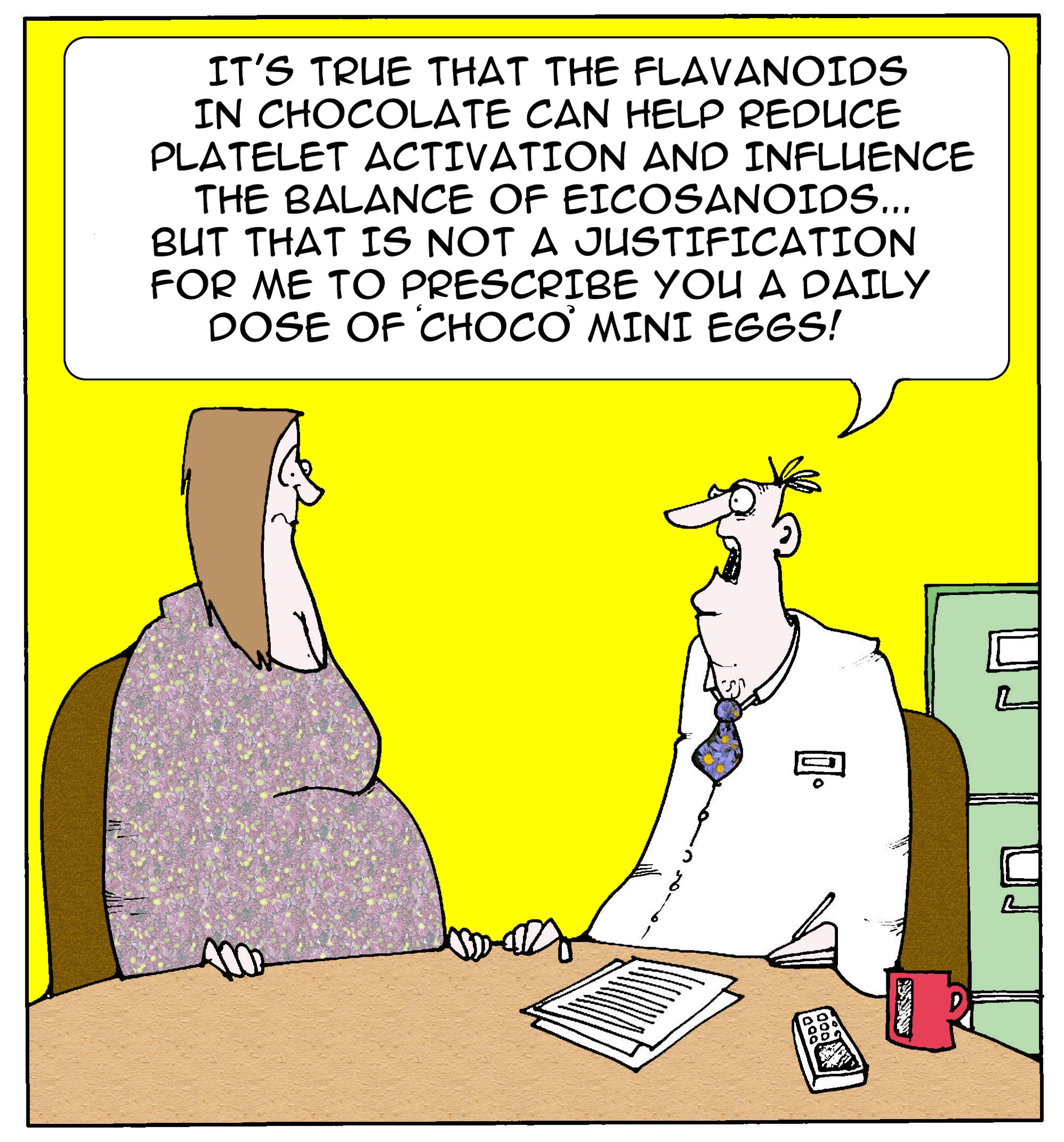Friday NewsFlash: more loco for cocoa, the ‘why’s’ have it!
 Guess what? Research presented at this week’s American Chemical Society Meeting in Dallas appears to demonstrate the reasons why dark chocolate might be good for your health: microbes in your gut.
Guess what? Research presented at this week’s American Chemical Society Meeting in Dallas appears to demonstrate the reasons why dark chocolate might be good for your health: microbes in your gut.
Like many writers, I’ve been reporting on chocolate for some time now and yet, while theories have focused on flavanols, neither cause and effect, or the exact reasons for benefits have been clear. However, Lousiana State University scientists say that good microbes in your gut – lactic acid and a type knowns Bifedobacterium – actually breakdown the antioxidant properties in cocoa (e.g. cathechin and epicatechin), ferment it and produce smaller molecules that are anti-inflammatory. In other words, they are believed to help reverse the body’s low-grade inflammation that leads to heart attack, stroke and other heart-related conditions. The discovery came when the scientists exposed three different cocoa powders to simulated digestion and then fermented the non-digestable materials.
Another related finding is that when prebiotics — carbohydrates that are found in foods like raw garlic or cooked whole wheat flour — are combined with cocoa, namely the small amount of fiber in cocoa, they become like worker bees to further help break down the antioxidant compounds.
Now that we have the why, let’s hope that researchers confirm an actual cause and effect. Right now, they can only confirm an association. But having your dark chocolate and eating it too may be one of the best things you can do for your heart health, at least, in moderation.
Read MoreLoco for cocoa – chocolate and your heart
 Last June and August, I wrote about the link between eating chocolate and improving heart health. Briefly, researchers have long been interested in flavonoids and in particular (at least in so far as menopause goes) in isoflavones. (See soy posts for more on isoflavones). The specific compound or molecule of interest in cocoa (the non-fat component cocoa bean extract or liquor) are flavanols, which are also found in lower concentration in apricots, peaches, apples, green and black tea, red wine and cider). Note that the quantity of flavanols in chocolate depends on manufacturing, including fermentation and roasting, and how much treatment is given to reducing bitterness and improving consistency. What this means is that dark chocolate has the highest concentration of flavanols and milk, the lowest.
Last June and August, I wrote about the link between eating chocolate and improving heart health. Briefly, researchers have long been interested in flavonoids and in particular (at least in so far as menopause goes) in isoflavones. (See soy posts for more on isoflavones). The specific compound or molecule of interest in cocoa (the non-fat component cocoa bean extract or liquor) are flavanols, which are also found in lower concentration in apricots, peaches, apples, green and black tea, red wine and cider). Note that the quantity of flavanols in chocolate depends on manufacturing, including fermentation and roasting, and how much treatment is given to reducing bitterness and improving consistency. What this means is that dark chocolate has the highest concentration of flavanols and milk, the lowest.
What have researchers learned so far?
- Flavanols found in cocoa and cocoa powder may be powerful antioxidants and as such, help to mitigate certain factors that contribute to atherosclerosis, such as the formation of plaques in the arteries that lead to stroke and other coronary events. Thus, as antioxidants, they may actually neutralize toxic oxygen species circulating in the bloodstream.
- Experimental data suggest that ingestion of flavanols may help to regulate proteins and other compounds that encourage an inflammatory response to leads to heart disease.
- Flavanols may also help to stabilize the lining and muscular tone of the arteries and prevent them from narrowing.
- Additionally, flavanols may moderately protect against high blood pressures, although studies have been mixed.
- Finally, flavanols may help to maintain blood sugar levels and improve the ratio of good to bad fats in the blood.
However, while numerous studies suggest that chocolate may benefit the heart, less clear is whether or not a causal relationship exists. Still, the idea is attractive enough that researchers continue to delve into the potential benefits of functional foods containing flavonoids and in flavonols found in dark chocolate. This time, writing in the journal Appetite, they report on a newly published study that examined the effect of eating flavonoid-rich dark chocolate on a process called oxidative stress, in which the ratio of circulating oxygen free radicals to circulating antioxidants is imbalanced (free radicals are those nasty, unstable molecules or atoms that can wreak havoc and lead to disease, including heart disease, diabetes and high cholesterol).
Over a period of three weeks, 25 healthy men and women were asked to eat 50 g of dark chocolate daily. The women in this particular study were premenopausal, primarily because use of hormone replacement has been shown to modify oxidative stress that has been attributed specifically to LDL (low density lipoprotein, also known as the bad cholesterol). They also omitted any other cocoa products from their diet and tea, red wine and other drinks that were rich in antioxidants.
Not only did eating dark chocolate daily have no impact on body mass index or the subjects’ weight, but it significantly increased the percentage of HDL (high density lipoprotein or good cholesterol) and led to a significant declines in blood fats levels as well. Dark chocolate consumption also appeared to lower markers of oxidative stress and damage to good fats in cells by almost 27% in women in the study, indicating a favorable effect on LDL, a change that was not similarly observed in men. This suggests that eating dark chocolate could possibly benefit women more than men, at least in terms of the heart. And, while menopausal women were not studied, the researchers say that the protective role of dark chocolate could possibly be especially favorable during menopause, when waning levels of estrogen make women particularly sensitive to oxidative damage and heart disease.
As with similar studies, we still don’t have a definitive cause and effect. However, a little dark chocolate has the potential to go a very long way.
Read More
Wednesday bubble: more cocoa loco – chocolate consumption and your heart
Back in June, I provided a thorough lowdown on the mysterious wonder known as chocolate and how it may or may not benefit your heart. Because I imagine that many of you have seen the latest headlines extolling the health power of chocolate, I thought it was important to clarify some of these latest findings, especially because women have a significant increase in heart disease as they enter and go through menopause.
So is it? Or isn’t it? That is, good for the heart?
A group of researchers have published an extensive review of studies examining chocolate consumption and risk of certain heart-related metabolic disorders (i.e. diabetes, coronary heart disease, congestive heart failure, heart attack and stroke). Of the seven included in the final writeup, five showed that the highest intake of chocolate was associated with roughly a third decrease in risk for any type of heart related metabolic disorder listed above, about 37% reduction for any type of heart disease, slightly over a third reduction in the risk for diabetes and about 29% reduced risk for stroke. These results remained even after the researchers looked at factors that might skew the results one way or another, such as age, level of physical activity, BMI, smoking, diet and drug use. However, all of the studies reported chocolate consumption differently, e.g. how often people ate chocolate, the type of chocolate (versus cocoa) consumed (chocolate bars, drinks or snacks) and the actually amount eaten daily or weekly. Most also relied on patient recall on how much chocolate they ate versus scientific records of chocolate eating patterns.
What you really need to know is that despite the sensationalist headlines about chocolate and its heart healthy benefits, these studies only showed an association and not a true cause (eating chocolate) and effect (less heart disease), which is critical.
The researchers say that excessive consumption of chocolate may actually have another effect: wight gain and increased risk for high blood pressure, diabetes, blood fat disorders and the like. And, as one of the researchers points out to my friend and colleague Nancy Shute, a reporter and blogger for NPR, all the study really showed was that people who reported that they ate a lot of chocolate were about a third less likely to develop diabetes, stroke or have a heart attack.
So, what’s next on the chocolate horizon? Researchers need cause and effect studies that corroborate the association that they are seeing. That means a randomized, scientific trial that compares amounts, types and conditions among healthy or unhealthy individuals. In the interim, it’s probably not the best idea to start eating mega amounts of chocolate to save your heart.
However, as grandma always told me “everything in moderation.” A little bit of chocolate can go a long, long way! And certainly can’t hurt.
Read MoreCocoa loco? The lowdown on chocolate and heart disease
[youtube=http://www.youtube.com/watch?v=RZ-uV72pQKI]
If you are a chocoholic, I bet you’ve noticed the headlines linking chocolate to a reduced risk of heart disease. In fact, data from the Kuna Indians (a tribe indigenous to Panama) have shown that cocoa and in particular dark chocolate are associated with declines in blood pressure. More recently, a large government study showed an even greater benefit in terms of a significant reduction in coronary heart disease prevalence. And in women, who have an increased risk for heart disease as they age (not only due to the increase in abdominal fat or changes in their blood fat levels but also to loss of ovarian function), chocolate has ben shown to slightly lower the risk of dying from heart disease.
Sounds promising and quite frankly, awesome, right?
Well…before you run out to the grocery or chocolate shop, you may want to read further…
Researchers have long been interested in flavonoids and in particular (at least in so far as menopause goes) in isoflavones. (See soy posts for more on isoflavones). The specific compound or molecule of interest in cocoa (the non-fat component cocoa bean extract or liquor) are flavanols, which are also found in lower concentration in apricots, peaches, apples, green and black tea, red wine and cider). Note that the quantity of flavanols in chocolate depends on manufacturing, including fermentation and roasting, and how much treatment is given to reducing bitterness and improving consistency. What this means is that dark chocolate has the highest concentration of flavanols and milk, the lowest.
What have researchers learned so far?
- Flavanols found in cocoa and cocoa powder may be powerful antioxidants and as such, help to mitigate certain factors that contribute to atherosclerosis, such as the formation of plaques in the arteries that lead to stroke and other coronary events. Thus, as antioxidants, they may actually neutralize toxic oxygen species circulating in the bloodstream.
- Experimental data suggest that ingestion of flavanols may help to regulate proteins and other compounds that encourage an inflammatory response to leads to heart disease.
- Flavanols may also help to stabilize the lining and muscular tone of the arteries and prevent them from narrowing.
- Additionally, flavanols may moderately protect against high blood pressures, although studies have been mixed.
- Finally, flavanols may help to maintain blood sugar levels and improve the ratio of good to bad fats in the blood.
Wow, this sounds fantastic! And all it takes is a daily diet of dark chocolate?
Here’s the great news. Researchers are devoting increasing amounts of time toward learning how certain foods affect (and benefit) health. However, in so far as chocolate goes? In a thorough review published online in Maturitas, they write that of the studies that have been conducted, it’s truly difficult to determine whether or not there is a causal relationship, i.e. eating A causes B, or eating chocolate prevents heart disease. In the case of chocolate in particular, factors like manufacturing can influence study findings. Moreover, researchers still aren’t sure if they should be focusing on flavanols or some other component of cocoa. It is also possible that only people who already have some sort of problem or condition will benefit from eating more chocolate.
The bottom line? Dark chocolate in moderation, won’t hurt you and may actually help you. However, you may want to temper expectations. At least a wee bit. Dare to dream though…perhaps cocoa will ultimately defy explanation!
Read MoreTrick or… chocolate and memory!
Credit: Mars Chocolate, Hackettstown
Trick???? Or, Treat?????
Got chocolate on your minds today? Before you raid the candy bowl or your children’s haul for the evening, you may want to consider the following:
Halloween chocolate is not going to improve your memory.
I know! It was all over the news.
And, while it is true that study findings appearing last Sunday in the online edition of Nature Neuroscience demonstrated that dietary cocoa flavonals — natural compounds that are found in cocoa –reversed age-related memory decline in 37 people between the ages of 50 and 60, the media didn’t pain the entire story.
The findings…when the researchers administered brain imaging and memory tests to the volunteers given a drink containing 900 mg flavonals, they saw noticeable improvements in both the function of the region of the brain critical to memory (called the dentate gyrus) and in the ability to recognize and recall patterns. They explained that if a person had the memory of a 60-year-old at the beginning of the study, after three months, memory improved to that of a 30-year old.
Pretty cool!
However, here’s the rub: the product used in the study is not the same as commercially-available chocolate; in fact, cocoa flavonals are only found in very small amounts in average chocolate bars. To realize any similar benefits, you’d need to eat about seven dark chocolate bars or 100 grams of baking cocoa daily. And, the study authors say that the amount of flavonals vary depending on processing.
An alternative way to improve memory and dentate gyrus function, at least in younger people, is exercise.
So, the idea that Halloween candy will improve your memory is simply a trick. If you want this treat, you’ll need to look away from the candy bowl!
Read More







